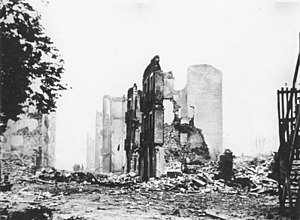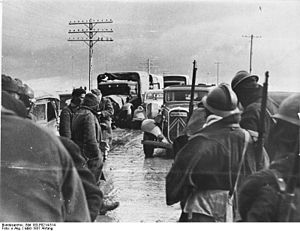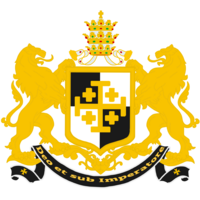St. Romero I of Creeperopolis: Difference between revisions
No edit summary |
No edit summary |
||
| Line 35: | Line 35: | ||
}} | }} | ||
'''Romero I of [[Creeperopolis]]''' (Full name: Romero I Adolfo Martínez Galdámez; June 18, 1899-July 6, 1946) was Emperor of Creeperopolis from 1933-1946. He assumed power after the death of his father, [[Adolfo IV]], and lead the [[Catholic Imperial Restoration Council]] (Romerists) during the bloody [[Creeperian Civil War]]. | '''Romero I of [[Creeperopolis]]''' (Full name: Romero I Adolfo Martínez Galdámez; June 18, 1899-July 6, 1946) was Emperor of Creeperopolis from 1933-1946. He assumed power after the death of his father, [[Adolfo IV of Creeperopolis|Adolfo IV]], and lead the [[Catholic Imperial Restoration Council]] (Romerists) during the bloody [[Creeperian Civil War]]. | ||
Romero Martínez Galdámez was born in [[San Salvador (city)|San Salvador]], [[Creeperopolis]] as royalty on June 18, 1899. His father was then Grand Prince [[Adolfo IV|Adolfo Alexander Martínez Jiménez]] and his mother was [[Rafaela Galdámez Águila|Rafaela María Galdámez Águila de Martínez]]. Alexander Martínez was raised as a [[Creeperian Catholic Church|Creeperian Catholic]]. | Romero Martínez Galdámez was born in [[San Salvador (city)|San Salvador]], [[Creeperopolis]] as royalty on June 18, 1899. His father was then Grand Prince [[Adolfo IV of Creeperopolis|Adolfo Alexander Martínez Jiménez]] and his mother was [[Rafaela Galdámez Águila|Rafaela María Galdámez Águila de Martínez]]. Alexander Martínez was raised as a [[Creeperian Catholic Church|Creeperian Catholic]]. | ||
When his father, [[Adolfo IV]], died on January 2, 1933, his brother, [[Miguel VII]], declared himself [[Emperor of Creeperopolis]] beginning the [[Creeperian Civil War]]. The civil war saw many atrocities and was the bloodiest in Creeperian history claiming up to 30,000,000 lives. He was killed in July 1946 during the [[Battle of San Salvador]]. He was succeeded by his son [[Romero II]]. | When his father, [[Adolfo IV of Creeperopolis|Adolfo IV]], died on January 2, 1933, his brother, [[Miguel VII of Creeperopolis|Miguel VII]], declared himself [[List of Creeperian Monarchs|Emperor of Creeperopolis]] beginning the [[Creeperian Civil War]]. The civil war saw many atrocities and was the bloodiest in Creeperian history claiming up to 30,000,000 lives. He was killed in July 1946 during the [[Battle of San Salvador]]. He was succeeded by his son [[Romero II of Creeperopolis|Romero II]]. | ||
Romero I was canonized as a Saint in the [[Creeperian Catholic Church]] by Pope St. [[ | Romero I was canonized as a Saint in the [[Creeperian Catholic Church]] by Pope St. [[Juan Pablo II of Creeperopolis|Juan Pablo II]] in 1987. [[St. Romero I Martínez International Airport|Emperor Saint Romero I Adolfo Martínez Galdámez International Airport]] was named after him in July 2019. | ||
= Early Life = | = Early Life = | ||
Romero I Adolfo Martínez Galdámez was born on June 18, 1899, at the [[San Salvador Imperial Palace]] in [[San Salvador (city)|San Salvador]], [[San Salvador (department)|San Salvador]], [[Creeperopolis]]. His father was then | Romero I Adolfo Martínez Galdámez was born on June 18, 1899, at the [[San Salvador Imperial Palace]] in [[San Salvador (city)|San Salvador]], [[San Salvador (department)|San Salvador]], [[Creeperopolis]]. His father was then Prince [[Adolfo IV of Creeperopolis|Adolfo Alexander Martínez Jiménez]] and his mother was then Princess [[Rafaela Galdámez Águila|Rafaela María Galdámez Águila de Martínez]]. His uncles were then [[List of Salvadoran Monarchs|Grand Prince]] [[Alfonso V of Creeperopolis|Alfonso Alexander Martínez Jiménez]] and [[List of Creeperian Monarchs|Emperor]] [[Alexander I of Creeperopolis|Alexander I Adolfo Martínez Jiménez]]. His grandfather was Emperor [[Maximiliano II of Creeperopolis|Maximiliano II Adolfo Martínez González]] and his great grandfather was Emperor [[Adolfo III of Creeperopolis|Adolfo III Alexander Martínez Schuessler "the Great"]]. | ||
Romero was the oldest of three brothers. His brothers were Prince [[Miguel Adolfo Martínez Galdámez]] and Prince [[Alfonso Adolfo Martínez Galdámez]]. Alexander I died in 1910 and Romero's uncle became Emperor Alfonso V. In 1918, both his brother, Alfonso, and his uncle, Alfonso V, died. His father became Emperor Adolfo IV. | Romero was the oldest of three brothers. His brothers were Prince [[Miguel Adolfo Martínez Galdámez]] and Prince [[Alfonso Adolfo Martínez Galdámez]]. Alexander I died in 1910 and Romero's uncle became Emperor Alfonso V. In 1918, both his brother, Alfonso, and his uncle, Alfonso V, died. His father became Emperor Adolfo IV. | ||
| Line 56: | Line 56: | ||
Miguel favored the [[People's Social Coalition]] (CSP) in the [[Second Parliament of Creeperopolis|Parliament]] while Romero supported the [[Creeperian Conservative Coalition]] (CCC). | Miguel favored the [[People's Social Coalition]] (CSP) in the [[Second Parliament of Creeperopolis|Parliament]] while Romero supported the [[Creeperian Conservative Coalition]] (CCC). | ||
King Adolfo IV died on January 2, 1933 to [[Creeperian Malaria]] at 9:02am [[San Salvador Standard Time]] (SST). The news was given to both Romero and Miguel, but both declared themselves the next rightful [[Emperor of Creepeorpolis]]. | King Adolfo IV died on January 2, 1933 to [[Creeperian Malaria]] at 9:02am [[San Salvador Standard Time]] (SST). The news was given to both Romero and Miguel, but both declared themselves the next rightful [[List of Creeperian Monarchs|Emperor of Creepeorpolis]]. | ||
Hearing the news of Romero I declaring himself Emperor, Miguel ordered that the [[Creeperian Armed Forces]] immediately have Romero I arrested. Romero I did the same, and ordered the Creeperian Armed Forces to immediately arrest Miguel VII. The Creeperian Armed Forces quickly splintered into factions of the armed forces backing Romero I while the other half supported Miguel VII. | Hearing the news of Romero I declaring himself Emperor, Miguel ordered that the [[Creeperian Armed Forces]] immediately have Romero I arrested. Romero I did the same, and ordered the Creeperian Armed Forces to immediately arrest Miguel VII. The Creeperian Armed Forces quickly splintered into factions of the armed forces backing Romero I while the other half supported Miguel VII. | ||
| Line 62: | Line 62: | ||
{{Romerism Sidebar}} | {{Romerism Sidebar}} | ||
Romero I ordered the Armed Forces loyal to him to not attack soldiers loyal to Miguel VII for the time being. Miguel VII did the same, and ordered the Armed Forces loyal to him to not attack soldiers loyal to Romero I for the time being. However, at 7:23pm SST, soldiers loyal to Romero I encountered troops loyal to Miguel VII in a barrack in [[North San Salvador]]. Both forces were ordered to secure the barrack to prevent the other side from securing the weapons inside. At 7:25pm SST, firing began, and both sides started to fire on the other. The soldiers loyal to Miguel VII overran the soldiers loyal to Romero I and forced them to retreat the barrack. The soldiers loyal to Romero I took up positions one block from the barrack taking the city capitol turning it into their fortification. It remains a mystery who was the first to fire their rifle in the barrack. | Romero I ordered the Armed Forces loyal to him to not attack soldiers loyal to Miguel VII for the time being. Miguel VII did the same, and ordered the Armed Forces loyal to him to not attack soldiers loyal to Romero I for the time being. However, at 7:23pm SST, soldiers loyal to Romero I encountered troops loyal to Miguel VII in a barrack in [[North San Salvador (city)|North San Salvador]]. Both forces were ordered to secure the barrack to prevent the other side from securing the weapons inside. At 7:25pm SST, firing began, and both sides started to fire on the other. The soldiers loyal to Miguel VII overran the soldiers loyal to Romero I and forced them to retreat the barrack. The soldiers loyal to Romero I took up positions one block from the barrack taking the city capitol turning it into their fortification. It remains a mystery who was the first to fire their rifle in the barrack. | ||
Both Romero I and Miguel VII were informed by their soldiers of the event and both declared war on the other at 10pm SST beginning the [[Creeperian Civil War]] | Both Romero I and Miguel VII were informed by their soldiers of the event and both declared war on the other at 10pm SST beginning the [[Creeperian Civil War]] | ||
| Line 75: | Line 75: | ||
]] | ]] | ||
Romero I received the political support from the CCC, which was composed of four parties: the [[ | Romero I received the political support from the CCC, which was composed of four parties: the [[Catholic Royalist Party]] (Partido Real Católico, PRC), the [[National Conservative Party (Creeperopolis)|National Conservative Party]] (Partido Conservador Nacional, PCN), and the [[Creeperian Pro-Fatherland Front]] (Frente Pro-Patria Creeperiano, FPPC). All three parties were right-wing to far-right, supported the monarchy, and called for a Catholic Revival in Creeperopolis. | ||
The Romerists didn't only receive significant political support from the Parliament, but also received significant support from the Creeperian Armed Forces, albeit half of the armed forces (as the other half joined the Miguelists), but also from two independent militant groups. The two groups were the [[Creeperian People’s Catholic Front]] (Frente Católico para el Pueblo Creeperiano, FCPC), also known as Cristeros, and the [[Militarist Nationalist Front]] (Frente Nacionalista Militarista), also known as FRENAMI, which still operates today. The FCPC was composed of mostly Creeperian civilians who joined the Romerists who fought against the Miguelists to secure themselves a safe Creepeorpolis to worship their God in peace, while FRENAMI was founded by Creeperian Army generals who believed vigilante justice was the only solution to end the war, and took it upon themselves to commit war crimes against the Miguelists. | The Romerists didn't only receive significant political support from the Parliament, but also received significant support from the Creeperian Armed Forces, albeit half of the armed forces (as the other half joined the Miguelists), but also from two independent militant groups. The two groups were the [[Creeperian People’s Catholic Front]] (Frente Católico para el Pueblo Creeperiano, FCPC), also known as Cristeros, and the [[Militarist Nationalist Front]] (Frente Nacionalista Militarista), also known as FRENAMI, which still operates today. The FCPC was composed of mostly Creeperian civilians who joined the Romerists who fought against the Miguelists to secure themselves a safe Creepeorpolis to worship their God in peace, while FRENAMI was founded by Creeperian Army generals who believed vigilante justice was the only solution to end the war, and took it upon themselves to commit war crimes against the Miguelists. | ||
| Line 81: | Line 81: | ||
[[File:232 14 Alexandre raccompagne Alexandre jusqu'au train.jpg|thumb|right|Romero I (right) meeting with Chief Field Marshal [[Adolfo Cabañeras Moreno]] (left), 1944.]] | [[File:232 14 Alexandre raccompagne Alexandre jusqu'au train.jpg|thumb|right|Romero I (right) meeting with Chief Field Marshal [[Adolfo Cabañeras Moreno]] (left), 1944.]] | ||
The Romerists also received support from the [[Principality of El Salvador]] due to the [[Salvadoran War]] and from the [[Second State of the Church]] due to the [[Papal War]]. [[Kingdom of Castilliano|Castilliano]], [[Kingdom of Atlántida|Atlántida]], and [[Quebecshire]] also pledged support ranging from direct military support to trading war goods. | The Romerists also received support from the [[El Salvador|Principality of El Salvador]] due to the [[Salvadoran War]] and from the [[Second State of the Church]] due to the [[Papal War]]. [[Kingdom of Castilliano|Castilliano]], [[Kingdom of Atlántida|Atlántida]], and [[Quebecshire]] also pledged support ranging from direct military support to trading war goods. | ||
The Romerists secured [[Salvador (city)|San Salvador]], [[Adolfosburg (city)|Adolfosburg]], and [[San Salvador (city)|San Salvador]], the three major cities of [[Creeperopolis]], by February. The Miguelists established the [[State of Grenada]] in El Salvador in January 1933. It would be defeated in 1935 after the fall of [[Ciudad Los'Ángeles]]. | The Romerists secured [[Salvador (city)|San Salvador]], [[Adolfosburg (city)|Adolfosburg]], and [[San Salvador (city)|San Salvador]], the three major cities of [[Creeperopolis]], by February. The Miguelists established the [[State of Grenada]] in El Salvador in January 1933. It would be defeated in 1935 after the fall of [[Ciudad Los'Ángeles]]. | ||
| Line 106: | Line 106: | ||
Romero I has been considered a martyr for [[Creeperopolis]] and the Creeperian Catholic Church from the date of his death by many. | Romero I has been considered a martyr for [[Creeperopolis]] and the Creeperian Catholic Church from the date of his death by many. | ||
After the civil war ended, several streets, buildings, and airports in San Salvador and Creeperopolis in general were named in his honor. The largest airport in Creeperopolis, [[St. Romero I Martínez International Airport|Emperor Saint Romero I Adolfo Martínez Galdámez International Airport]] was named after him in July 2019 on orders of Emperor [[Alexander II]]. | After the civil war ended, several streets, buildings, and airports in San Salvador and Creeperopolis in general were named in his honor. The largest airport in Creeperopolis, [[St. Romero I Martínez International Airport|Emperor Saint Romero I Adolfo Martínez Galdámez International Airport]] was named after him in July 2019 on orders of Emperor [[Alexander II of Creeperopolis|Alexander II]]. | ||
= Sainthood = | = Sainthood = | ||
| Line 139: | Line 139: | ||
[[File:Romero I coat of arms.png|thumb|left|Romero I's coat of arms.]] | [[File:Romero I coat of arms.png|thumb|left|Romero I's coat of arms.]] | ||
On September 25, 1983, Romero I was beatified by Pope [[ | On September 25, 1983, Romero I was beatified by Pope [[Juan Pablo II of Creeperopolis|Juan Pablo II]] in St. Peter's Square in the [[Second State of the Church|Papal State]]. | ||
On July 6, 1987, Romero I was canonized by Pope [[ | On July 6, 1987, Romero I was canonized by Pope [[Juan Pablo II of Creeperopolis|Juan Pablo II]] in St. Peter's Square in the [[Second State of the Church|Papal State]]. The ceremony was attended by Emperor [[Romero III of Creeperopolis|Romero III]] and approximately 8,000,000 Catholic Creeperans from all across [[Creeperopolis]]. | ||
Romero I is the patron saint of [[Creeperopolis]], Creeperian Catholics, Martyred Catholics, [[San Salvador (city)|San Salvador]], and the [[ | Romero I is the patron saint of [[Creeperopolis]], Creeperian Catholics, Martyred Catholics, [[San Salvador (city)|San Salvador]], and the [[List of Creeperian Monarchs|Creeperian Monarchy]]. | ||
Romero I was the first Creeperian saint and the first saint from the [[Creeperian Civil War]]. | Romero I was the first Creeperian saint and the first saint from the [[Creeperian Civil War]]. | ||
Revision as of 03:00, 7 January 2020
| Romero I | |
|---|---|
 | |
| Reign | January 2, 1933-July 6, 1946 |
| Coronation | September 15, 1933 |
| Predecessor | Adolfo IV |
| Successor | Romero II |
| Prime Minister | Máximo Illescas Freixa |
| Grand Prince of Creeperopolis | |
| Reign | June 3, 1918-January 2, 1933 |
| Predecessor | Adolfo II |
| Successor | Romero II |
| Born | June 18, 1899 |
| Died | July 6, 1946 (aged 47) |
| Spouse | |
| Issue | |
| House | House of Martínez |
| Father | Adolfo IV |
| Mother | Rafaela María Galdámez Águila de Martínez |
| Religion | Creeperian Catholicism |
Romero I of Creeperopolis (Full name: Romero I Adolfo Martínez Galdámez; June 18, 1899-July 6, 1946) was Emperor of Creeperopolis from 1933-1946. He assumed power after the death of his father, Adolfo IV, and lead the Catholic Imperial Restoration Council (Romerists) during the bloody Creeperian Civil War.
Romero Martínez Galdámez was born in San Salvador, Creeperopolis as royalty on June 18, 1899. His father was then Grand Prince Adolfo Alexander Martínez Jiménez and his mother was Rafaela María Galdámez Águila de Martínez. Alexander Martínez was raised as a Creeperian Catholic.
When his father, Adolfo IV, died on January 2, 1933, his brother, Miguel VII, declared himself Emperor of Creeperopolis beginning the Creeperian Civil War. The civil war saw many atrocities and was the bloodiest in Creeperian history claiming up to 30,000,000 lives. He was killed in July 1946 during the Battle of San Salvador. He was succeeded by his son Romero II.
Romero I was canonized as a Saint in the Creeperian Catholic Church by Pope St. Juan Pablo II in 1987. Emperor Saint Romero I Adolfo Martínez Galdámez International Airport was named after him in July 2019.
Early Life
Romero I Adolfo Martínez Galdámez was born on June 18, 1899, at the San Salvador Imperial Palace in San Salvador, San Salvador, Creeperopolis. His father was then Prince Adolfo Alexander Martínez Jiménez and his mother was then Princess Rafaela María Galdámez Águila de Martínez. His uncles were then Grand Prince Alfonso Alexander Martínez Jiménez and Emperor Alexander I Adolfo Martínez Jiménez. His grandfather was Emperor Maximiliano II Adolfo Martínez González and his great grandfather was Emperor Adolfo III Alexander Martínez Schuessler "the Great".
Romero was the oldest of three brothers. His brothers were Prince Miguel Adolfo Martínez Galdámez and Prince Alfonso Adolfo Martínez Galdámez. Alexander I died in 1910 and Romero's uncle became Emperor Alfonso V. In 1918, both his brother, Alfonso, and his uncle, Alfonso V, died. His father became Emperor Adolfo IV.
Romero and Miguel joined the military in 1925 and were both promoted to Field Marshal by their father.
Miguel favored the People's Social Coalition (CSP) in the Parliament while Romero supported the Creeperian Conservative Coalition (CCC).
King Adolfo IV died on January 2, 1933 to Creeperian Malaria at 9:02am San Salvador Standard Time (SST). The news was given to both Romero and Miguel, but both declared themselves the next rightful Emperor of Creepeorpolis.
Hearing the news of Romero I declaring himself Emperor, Miguel ordered that the Creeperian Armed Forces immediately have Romero I arrested. Romero I did the same, and ordered the Creeperian Armed Forces to immediately arrest Miguel VII. The Creeperian Armed Forces quickly splintered into factions of the armed forces backing Romero I while the other half supported Miguel VII.
Romero I ordered the Armed Forces loyal to him to not attack soldiers loyal to Miguel VII for the time being. Miguel VII did the same, and ordered the Armed Forces loyal to him to not attack soldiers loyal to Romero I for the time being. However, at 7:23pm SST, soldiers loyal to Romero I encountered troops loyal to Miguel VII in a barrack in North San Salvador. Both forces were ordered to secure the barrack to prevent the other side from securing the weapons inside. At 7:25pm SST, firing began, and both sides started to fire on the other. The soldiers loyal to Miguel VII overran the soldiers loyal to Romero I and forced them to retreat the barrack. The soldiers loyal to Romero I took up positions one block from the barrack taking the city capitol turning it into their fortification. It remains a mystery who was the first to fire their rifle in the barrack.
Both Romero I and Miguel VII were informed by their soldiers of the event and both declared war on the other at 10pm SST beginning the Creeperian Civil War
Reign and Civil War
Creeperopolis split into two opposing factions: the Catholic Imperial Restoration Council (CRIC, nicknamed the Romerists) and the National Council for Peace and Order (CNPO, nicknamed the Miguelists). The Romerists were heavily Catholic and Monarchist while the Miguelists were heavily Secular and Communist.
Romero I received the political support from the CCC, which was composed of four parties: the Catholic Royalist Party (Partido Real Católico, PRC), the National Conservative Party (Partido Conservador Nacional, PCN), and the Creeperian Pro-Fatherland Front (Frente Pro-Patria Creeperiano, FPPC). All three parties were right-wing to far-right, supported the monarchy, and called for a Catholic Revival in Creeperopolis.
The Romerists didn't only receive significant political support from the Parliament, but also received significant support from the Creeperian Armed Forces, albeit half of the armed forces (as the other half joined the Miguelists), but also from two independent militant groups. The two groups were the Creeperian People’s Catholic Front (Frente Católico para el Pueblo Creeperiano, FCPC), also known as Cristeros, and the Militarist Nationalist Front (Frente Nacionalista Militarista), also known as FRENAMI, which still operates today. The FCPC was composed of mostly Creeperian civilians who joined the Romerists who fought against the Miguelists to secure themselves a safe Creepeorpolis to worship their God in peace, while FRENAMI was founded by Creeperian Army generals who believed vigilante justice was the only solution to end the war, and took it upon themselves to commit war crimes against the Miguelists.

The Romerists also received support from the Principality of El Salvador due to the Salvadoran War and from the Second State of the Church due to the Papal War. Castilliano, Atlántida, and Quebecshire also pledged support ranging from direct military support to trading war goods.
The Romerists secured San Salvador, Adolfosburg, and San Salvador, the three major cities of Creeperopolis, by February. The Miguelists established the State of Grenada in El Salvador in January 1933. It would be defeated in 1935 after the fall of Ciudad Los'Ángeles.
Starting in 1935, the Miguelists began to commit atrocities against the Romerists.
FRENAMI was founded in 1940 by Creeperian Army generals and atrocities began to be committed against the Miguelists as a form of vigilante justice.
The war approached 13,000,000 dead in 1943 with war crimes on both sides such as unrestricted submarine warfare, deployment of child soldiers, use of chemical weapons, upon more.
The National Intelligence Directorate (abbreviated DINA) was founded during the civil war to purge Miguelists.
Death

On May 17, 1946, the Siege of San Salvador began for the capital city, San Salvador. Both Miguel VII and Romero I deemed the city as the most important city to retain control of and both commanded the battle personally.
On July 6, 1946, Romero I was killed in a massive artillery attack by the Miguelists. He was succeeded by his son Emperor Romero II who won the civil war on September 30, 1949 after the deaths of Miguel VII and Marcos I (Miguel VII's successor).
Legacy
Romero I has been considered a martyr for Creeperopolis and the Creeperian Catholic Church from the date of his death by many.
After the civil war ended, several streets, buildings, and airports in San Salvador and Creeperopolis in general were named in his honor. The largest airport in Creeperopolis, Emperor Saint Romero I Adolfo Martínez Galdámez International Airport was named after him in July 2019 on orders of Emperor Alexander II.
Sainthood
| Saint Emperor Romero I | |
|---|---|
 | |
| Emperor of Creeperopolis | |
| Born | June 18, 1899 San Salvador, Creeperopolis |
| Died | July 6, 1946 (aged 47) San Salvador, Creeperopolis |
| Venerated in | Creeperian Catholic Church |
| Beatified | September 25, 1983, St. Peter's Square, Papal State by Pope John Paul II |
| Canonized | July 6, 1987, St. Peter's Square, Papal State by Pope John Paul II |
| Feast | September 30 |
| Attributes | Coat of Arms, Imperial Order |
| Patronage | Creeperopolis, Creeperian Catholics, Martyred Catholics, San Salvador, Creeperian Monarchy |
On September 25, 1983, Romero I was beatified by Pope Juan Pablo II in St. Peter's Square in the Papal State.
On July 6, 1987, Romero I was canonized by Pope Juan Pablo II in St. Peter's Square in the Papal State. The ceremony was attended by Emperor Romero III and approximately 8,000,000 Catholic Creeperans from all across Creeperopolis.
Romero I is the patron saint of Creeperopolis, Creeperian Catholics, Martyred Catholics, San Salvador, and the Creeperian Monarchy.
Romero I was the first Creeperian saint and the first saint from the Creeperian Civil War.
His feast day is September 30, the day the civil war ended.
See Also
- Creeperian Civil War
- Catholic Imperial Restoration Council
- Creeperian People’s Catholic Front
- Militarist Nationalist Front
- Creeperian Catholic Church
- Emperor Romero II
- Emperor Alexander II
- 2003 Creeperian Coup D'état
- San Salvador
- Siege of San Salvador
- Emperor Saint Romero I Adolfo Martínez Galdámez International Airport
- Creeperian Airlines
- National Intelligence Directorate




